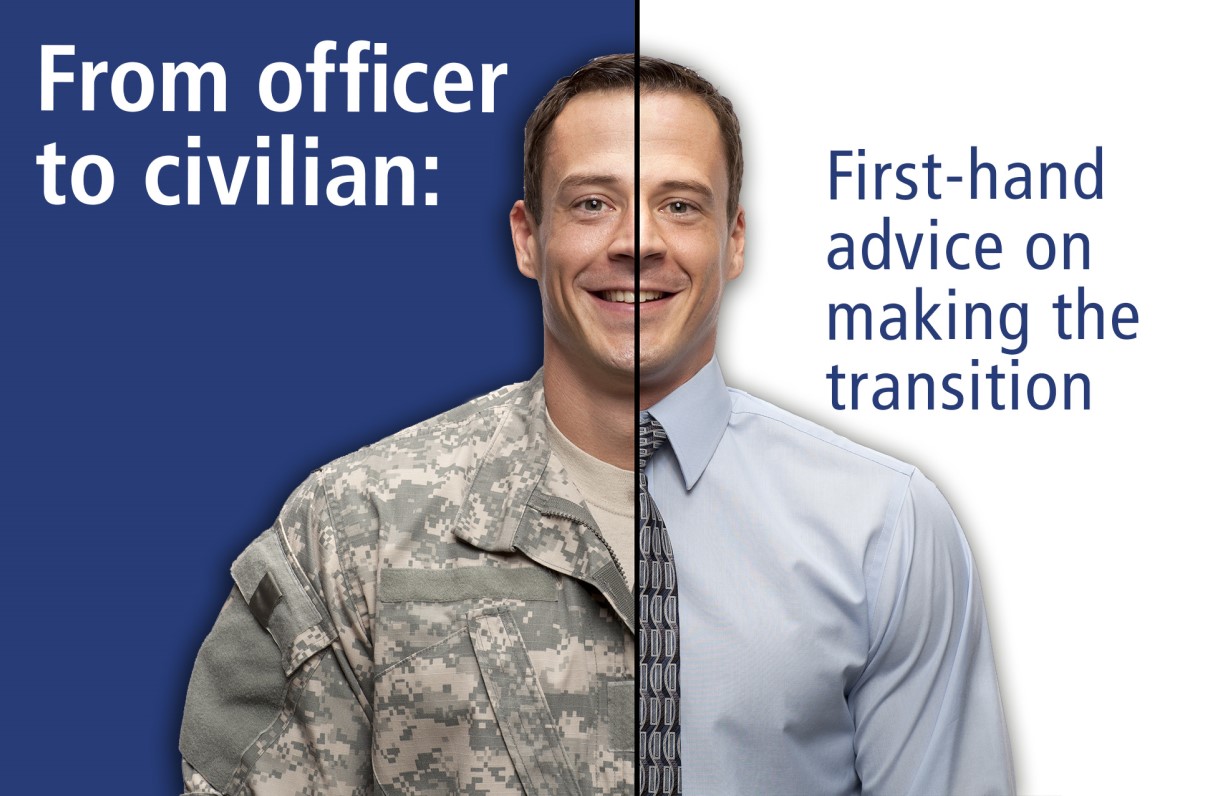This content is sponsored by MOAA Insurance plans.
Going from military officer to civilian is a major step in your life. Chances are, you feel a mix of excitement, apprehension, and uncertainty — and could use a little guidance. We encourage you to take advantage of the resources available to you, such as MOAA’s Transition Guide.
It’s also helpful to hear words of wisdom directly from other officers who have gone through the process. Military-Transition.org sponsored a survey, asking transitioning officers the following question:
What’s the most important advice or lesson you would share with someone considering a transition?
Here’s a sampling of the responses received from veteran officers:
“Start early.” This was the piece of advice heard most often — and it’s definitely wise. If you’re planning to begin a new career after the military, you’ll want to set the wheels in motion as soon as possible. Depending upon the field of your choice, finding the right job may require patience and persistence. As one respondent said, “Start looking at what you would like to do and try to fit your skills to the position early, months in advance.”
We would also advise getting an early start on exploring your insurance options for replacing or supplementing your current coverage. MOAA endorses a variety of insurance plans designed to help you transition to civilian life with confidence, including:
- Active Service Discharge Group Term Life Insurance Plan, offering up to $250,000 in coverage, depending on your age. Officers transitioning from active, uniformed service can take advantage of affordable group rates and a choice of benefit amounts on a guaranteed acceptance basis. Your spouse is also eligible to enroll. This plan option is only available if you enroll within 180 days of leaving active service.
- MEDIPLUS® TRICARE Supplement Insurance Plan, which works with TRICARE to help pay medical costs that would normally come out-of-pocket.
- Leader Group Term Life Insurance, available with coverage amounts up to $1 million, depending on your age. Compare rates to VGLI.
Visit MOAAinsurance.com/transition for more information on all the MOAA-endorsed plans available to transitioning officers.
“Network, network, network.” Once you’ve made the decision to transition, it’s time to make connections in the business world. A good way to start is by creating a LinkedIn profile. Review online tips for crafting a strong resumé and apply for every job for which you may be a good fit.
Go to networking events where you can meet potential employers or colleagues in person.
In the words of this veteran, “Hone your message, get a business card, and get out there to every event you can find.” Not every meeting has to be an interview; you may simply want to gain the perspective of someone already working in your desired profession.
“You bring more to the table.” As a military officer, you’ve gained skills, knowledge, and leadership qualities that can give you an edge in the civilian world. It’s important to let potential employers know this.
One veteran noted that you have more to offer than you — and even potential employers — may realize. Another respondent advised that you should “share the values and characteristics earned and learned in the service in a way a recruiter or HR person might better understand.”
If you’re retiring, consider volunteer opportunities. Your leadership skills would bring considerable value to any charitable cause that’s important to you.
“Utilize the services provided by the military.” Transitioning officers have access to a variety of resources to help make the most of civilian life or retirement. For instance, as several vets advised, you can take advantage of the Transition Assistance Program (TAP), which provides tools and training to help prepare you for civilian life.
One of the best resources available to you is the MOAA Transition and Career page, which can link you to transition and career guidance, a job board, and more.
You’ll also find more information on the insurance plans noted earlier at MOAAinsurance.com/transition. Keep in mind, MOAA Insurance Plans offers an Active Service Discharge Term Life Plan, which is a guaranteed acceptance life Insurance option, when you enroll within 180 days after leaving active uniformed service (provided your discharge is not health or disability related).
